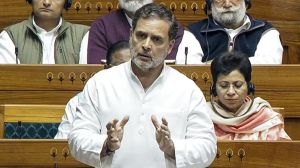Stay updated with the latest - Click here to follow us on Instagram
Participation of startups, non-government private entities vital for Space sector growth: ISRO chairman
If you really look at the hundreds plus startups that are there in the space (sector), what I see is the enthusiasm, energy and innovation, said ISRO chairman S Somanth.
 The one-day conference brought together space industry experts from government and non-government private entities (NGPE) space startups to deliberate ways to develop the NGPE vertical in India. (Express Photo)
The one-day conference brought together space industry experts from government and non-government private entities (NGPE) space startups to deliberate ways to develop the NGPE vertical in India. (Express Photo)Speaking at the national conference ‘Development of Space Startup Ecosystem in India organised by the Astronautical Society of India, chairman of the Indian Space Research Organisation (ISRO) S Somanth said the growth of the space sector cannot happen without the participation of non-government entities, startups and academia.
“We are providing services to the nation in the sectors of communication, remote sensing, navigation and various other strategic users. If you really want to expand the space activities in this country to a scale of magnitude which we all desire to have, then we need to have the role of non-government entities; let it be startups and academia. They have to come up in a big manner. If you really look at the hundreds plus startups that are there in the space (sector), what I see is the enthusiasm, energy and innovation. But what we need today is to encourage them, maybe in the form of knowledge from our system,” he said.
The one-day conference brought together space industry experts from government and non-government private entities (NGPE) space startups to deliberate ways to develop the NGPE vertical in India.
Lt Gen A K Bhatt, Director General, Indian Space Association said, “The space startups have already been receiving private capital incentives in the form of seed funding from angel investors and venture capitalists but in order to sustain themselves, they would require active procurement from the government and support for their future development. I am confident that the New Space Policy followed by the Space Activity Bill would ensure prompt and positive action on issues such as the availability of testing facilities, both on the ground and in space, as well as clarity on data use, import incentives and technical details.”
He hailed the government’s decision to open up the space domain to the private sector and said the establishment of the Indian National Space Promotion and Authorisation Centre (IN-SPACe) was a real game-changer. “The Prime Minister’s desire to form an apex space association for articulating and putting forward the aspirations and desires of the space community will help the industry grow multi-folds as the much-awaited policy is announced. Furthermore, the multitude of permissions and clearances required by the startups across several ministries is a major issue but I am convinced that with the establishment of IN-SPACe and its promise of a single window, many of these issues, as well as clarity in the FDI policy and intellectual property rights for IP created in the space will be addressed,” Gen Bhatt said.
IN-SPACe was approved by the government in June 2020. It is the nodal agency that would allow use of the Department of Space-owned facilities by non-governmental private entities thereby ensuring greater participation by the private sector.
IN-SPACe chairman Pawan Kumar Goenka said that the space sector is not an easy business and the new players entering the industry should know that they cannot make a large strike in one go.
“Industries have to see the financial viability of any project. No one should think that they can come into this sector and make large strides just like that. A lot of blood and sweat goes into this and anyone who is entering this sector should have the humility to know what they don’t know. They should look up to the experts and use them as mentors,” he added.
He further said that India needs to be more self-reliant in electronics and advanced materials that are imported to a large extent. “India has been slow to take off on investment in the space sector and up until 2021, the cumulative investment was about 100 million dollars. But the good news is that every year the investment is going up. Four companies have investments of more than $10 million in 2022 and I am waiting for the first unicorn. And once we have the first unicorn, I’m sure there will be a beeline of investors waiting to invest in Indian space startups,” Goenka added.
Referring to Elon Musk’s SpaceX, he said, “India will soon have its own SpaceX. I cannot say when but it will.”
Minister of State for Electronics and Information Technology, Rajeev Chandrasekhar, said, “Despite the cynicism that people will throw at you if you are a startup, do not be fazed by that. This is the time, this is the place and this is the moment for you to shine your idea,” he added.







